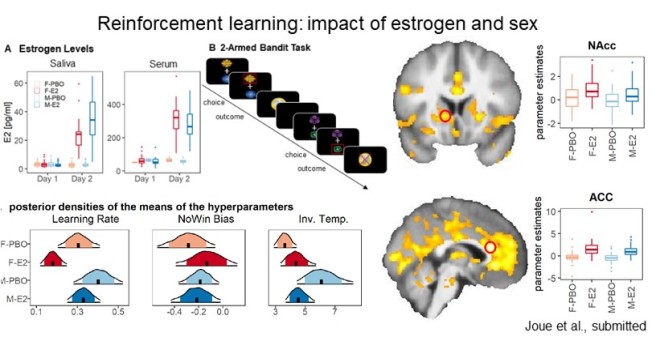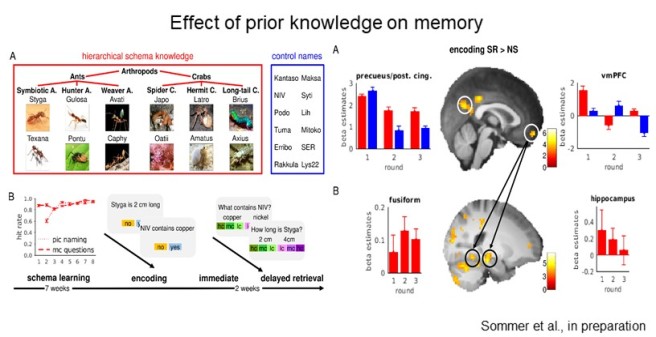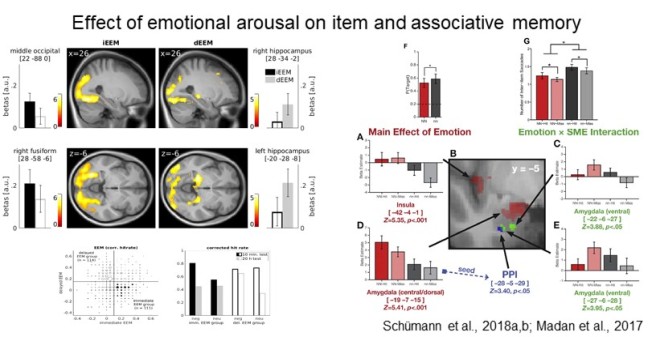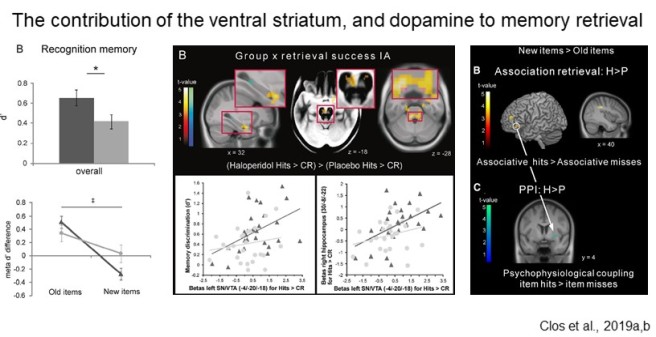Memory and decision making
Overview
My group studies at first glance very distinct research questions, i.e. not only
memory and decision making, but also how estrogen affects neural and cognitive processes. However, at the second sight these questions are not all only highly interesting themselves but also highly interrelated.
Why studying episodic memory?
Our subjective identity is a bundle of memories, in particular memories of episodes we experienced in our life. Not only which episodes of our life we remember but also the quality of these memories, for instance how vivid, how emotional, how detailed there are, influences how we think about us. Moreover, our memories of past experiences influence often also our decisions.
This relationship between our memories and our identity makes it particularly fascinating to study the cognitive, physiological and neural processes that modulate episodic memory formation, consolidation and retrieval as well as the interactions between memory and decision making.
Why studying the role of estrogen in the brain?
Estrogen is not only synthesized in the ovaries but also in the female and male brain. Besides its role in neural circuits coordinating the female reproductive cycle estrogen is an important neuromodulator for instance in the hippocampus, prefrontal cortex and the mesolimbic dopaminergic pathway of both, women and men. In the hippocampus for instance, E2 enhances synaptogenesis, the magnitude of LTP, stimulates NMDA receptor-mediated transmission and up-regulates NMDA receptor expression. Animal studies on the effects of estrogen on the dopaminergic system observed a modulation of dopamine-release, uptake, turnover and receptor binding, which might be also sexual dimorphic.
The fact that estrogen has two somewhat independent lives in our brains, one female specific and one in both sexes (although presumably partly sexual dimorphic) makes the investigation of its role particularly interesting.
-
Some of the specific research questions of the group
In one line of research my group characterizes the enhancing effects of emotional arousal on item memory as well as its inhibitory effects on associative memory. In addition, we study whether and how estrogen affects emotional distinct from neutral memories.
Prior knowledge or schemata influence which and how we encode and remember novel information which is another line of research we pursue.
The ventral striatum is not only involved in reward processing and decision making but also in memory retrieval. We study how the striatum and the dopaminergic system exactly contribute to memory retrieval.
Forming meaningful categories of stimuli based on feedback is essential for survival because it reduces the information we need to process and allow generalization to novel exemplars. Reinforcement learning and memory are closely interacting during real-life category learning which has not set been well understood. This interplay of memory and decision-making is therefore another of our research topics.
Animal data show not only that estrogen affects the dopaminergic system and decision-making but also a higher vulnerability of females for drug addiction which might be relate to that (e.g. more rapid escalation from recreational use to abuse). To translate these findings to humans, we study sex differences and the effects of estrogen on reinforcement learning and putative dopaminergic activity.
Another rather robust sex difference concerns spatial navigation for which reason we aim to dissociate the effects of structural (organizational) sex differences and estrogen on spatial abilities, navigation as well as brain activity related to these processes. -
Research Environment
The institute provides a vibrant research environment due to the currently 11 research groups that stimulate close collaborations. We not only have our offices all in the 1.5 floors of the institute but there are also several regular common events as the presentation and discussion of planned projects, our cognitive neuroscience colloquium series, methods meetings , and our graduate school. The latter is organized by myself and is a member of the Network of European Neuroscience Schools (NENS) and of the Max Planck Schools of Cognition. In addition, there are lots of interactions also with the great neuroscientific community of the UKE. The institute owns a 3T PRISMA MRI scanner and we are supported by our technical assistants and the MRI-physicists groups before and during scanning. In addition, the institute accommodates EEG, eye-tracking, TMS, virtual reality and behavioral labs that allow us to easily acquire data form a variety of complementing modalities.
Dr. Janine Bayer (Postdoc)
Janines research focuses on the influence of estrogen on memory, affective processing and the reward system. In her most recent project she tested the dose-response relationship of estrogen on hippocampal memory process and the mesolimbic dopaminergic pathway. Janine joined my group as a PhD student, stayed as a postdoc during which time she managed to complete in parallel a training as cognitive behavioral therapist and is now in the transition to work solely on her own grant on category learning in autism.
Dr. Gina Joue (Postdoc)
Better spatial navigation in men seems one of the few sex differences that have been identified over the last decades. Therefore, Gina investigates how organizational sex differences and activational effects of estrogen affect spatial memory, navigation and grid cell activity. This study is a collaboration with
Christian Döller.
Another, not yet widely recognized sex difference is the higher vulnerability of women for drug addiction which is based on animal data at least partly due to biological sex differences. Gina studies the underlying differences in the responsiveness of the dopaminergic system using a reinforcement learning paradigm.
MSc. Alina Dinu (Postdoc)
Alina investigates in her PhD project how category and reinforcement learning interact in the medial temporal lobe memory and the dopaminergic mesocorticolimbic systems. Therefore she developed a probabilistic category learning paradigm and participants learn at the same time category memberships and the expected value of the categories. In order to disentangle learning processes Alina acquires in the MRI scanner also eye-tracking data. Alina is supervised together by Jan Gläscher and me.
Anne Bierbrauer (Postdoc)
Study psychologists
Franziska Werner
Franziska works in her internship on the stability of the trait form of the widely used state-trait-anxiety-inventory (STAI). In particular, more than 100 volunteers filled out the STAI-T with 3-5 years distance. Her analyses will speak to the longstanding debate about the situational and temporal stability of traits.
Linus Kluth
Fiona Brown
Kira Diermann (Research Assistant)
Kira supports our group since 2017. She is not only a master in recruiting and scheduling volunteers for our complex, pharmacological study designs (e.g. naturally cycling women in their early follicular phase) but also in collecting behavioral data and scanning participants.
Franzi Feuchtner (Research Assistant)
Kai Schüren (Student Assistant)
Eva Klein (Student Assistant)
Henry Vossberger (Student Assistant)
Julia Lupim Millarch (Student Assistant)
Vivien Kleinow (Intern)
Marie Wachow (MD thesis)
Maries investigates whether the volume of the bed nucleus of the stria terminalis (bnst) together with volumes of amygdala nuclei is related to life adversity and affective traits. This project is a collaboration with Tina Lonsdorfs group .
Sepide Fazeli (MD thesis)
Sepide aims to replicate the sex differences in bnst-volume observed in post mortem studies using MRI and to test whether the bnst-volume of transmen is more similar to the desired sex. This project is a collaboration with Dr. Johannes Fuss from the Institute for Sex Research and Forensic Psychiatry at the UKE.
Astrid Gieske (PhD student)
Astrid PhD is on the interaction of noradrenergic and dopaminergic neuromodulation on episodic memory formation. Currently, Astrid is in maternal leave.
Franziska Singer (MD thesis)
Franziska employed for her MD a within-subject design to test whether estrogen affects memory using a widely used neuropsychological memory test.
Claire Erwins (MD thesis)
In her MD thesis project Claire tests the effects of different estrogen doses on ego- and allocentric spatial navigation in women.
Lea Nitzpon (intern)
Lea investigates in her internship how estrogen impacts mental rotation in women and men. Mental rotation is a cognitive function that shows robust sex differences which might be caused by societal-cultural factors and/or biological sex differences.
-
Alumni
Dipl.-Psych. Pia Bandurski (diploma thesis)
Dr. Gemma Barnacle (DAAD scholar as PhD Student, University of Manchester, England)
Prof. Jeremy Caplan (Sabbatical, University of Alberta, Edmonton, Canada)
Dr. Mareike Clos (postdoc)
Dr. Isabel Ellerbrock (research intern)
Prof. Esther Fujiwara (Sabbatical, University of Alberta, Edmonton Canada)
Dr. Nora Hennies (postdoc)
Dr. Angela Klingmüller (MD thesis)
Prof. Chris Madan (DAAD scholar as PhD student, University of Alberta, Edmonton, Canada)
Dr. Andreas Marschner (postdoc)
Lisa Phillip (study physician)
MSc. Katharina Richter (master thesis)
MSc. Romy Schröter (study psychologist, master thesis)
Dr. Dirk Schümann (study psychologist, PhD student)
Dr. Heidrun Schultz (PhD student)
Dr. Ulrike Schwarze (PhD student, postdoc)
Dr. Michael Tobia (postdoc)
Dr. Ole Wächtler (MD thesis)
Dr. Antonius Wiehler (research intern)







